The Importance of Nikah Khuwan in Court Marriage Process
Blog By: Asif Raza
The Significance of Nikah Khuwan in the Court Marriage Process
In the court marriage process, the Nikah Khuwan plays a pivotal role, serving as a key figure responsible for officiating the marriage ceremony and ensuring its legality and authenticity. Here’s why the role of a Nikah Khuwan is essential:
Legal Authority
The government authorizes the Nikah Khuwan to solemnize marriages according to the relevant legal procedures and requirements. Their presence is necessary to ensure that the marriage is conducted in accordance with the law, thereby making it legally binding.
Compliance with Shariah/Islamic Laws
For Muslim couples seeking a court marriage, the Nikah Khuwan ensures that the marriage ceremony adheres to Shariah/Islamic laws and rituals. They recite the necessary prayers and verses from the Quran, ensuring that the marriage is conducted in accordance with religious customs and traditions.
Witnessing and Attesting
As an official witness to the marriage, the Nikah Khuwan plays a crucial role in attesting to the consent of the parties involved and witnessing the exchange of vows. Their presence adds credibility to the marriage ceremony and serves as evidence of its occurrence.
Guidance and Counseling
The Nikah Khuwan may also offer guidance and counseling to the couple before the marriage ceremony, helping them understand the significance of marriage and their roles as spouses. They may provide advice on marital responsibilities, rights, and obligations, fostering a deeper understanding of the commitment they are about to undertake.
Ensuring Legal Formalities
Throughout the court marriage process, the Nikah Khuwan ensures that all legal formalities and documentation are completed accurately and in compliance with the law. They guide the couple through the necessary paperwork, including the signing of the Nikah Nama (marriage contract), and ensure that all required documents are submitted to the relevant authorities.
Symbol of Trust and Integrity
The presence of a Nikah Khuwan instills confidence in the marriage proceedings, reassuring the couple and their families that the marriage is being conducted with integrity and sincerity. Their role as a trusted officiant adds a sense of solemnity and authenticity to the ceremony, strengthening the bond between the couple.
Facilitating a Meaningful Ceremony
Beyond their legal and religious duties, the Nikah Khuwan helps create a meaningful and memorable marriage ceremony for the couple. They may personalize the ceremony to reflect the couple’s cultural background, preferences, and values, making the occasion truly special and significant.
In essence, the Nikah Khuwan plays a vital role in the court marriage process, ensuring the marriage is conducted with legality, authenticity, and reverence. Their presence adds value to the ceremony, guiding the couple through this critical milestone with wisdom, integrity, and respect for tradition.
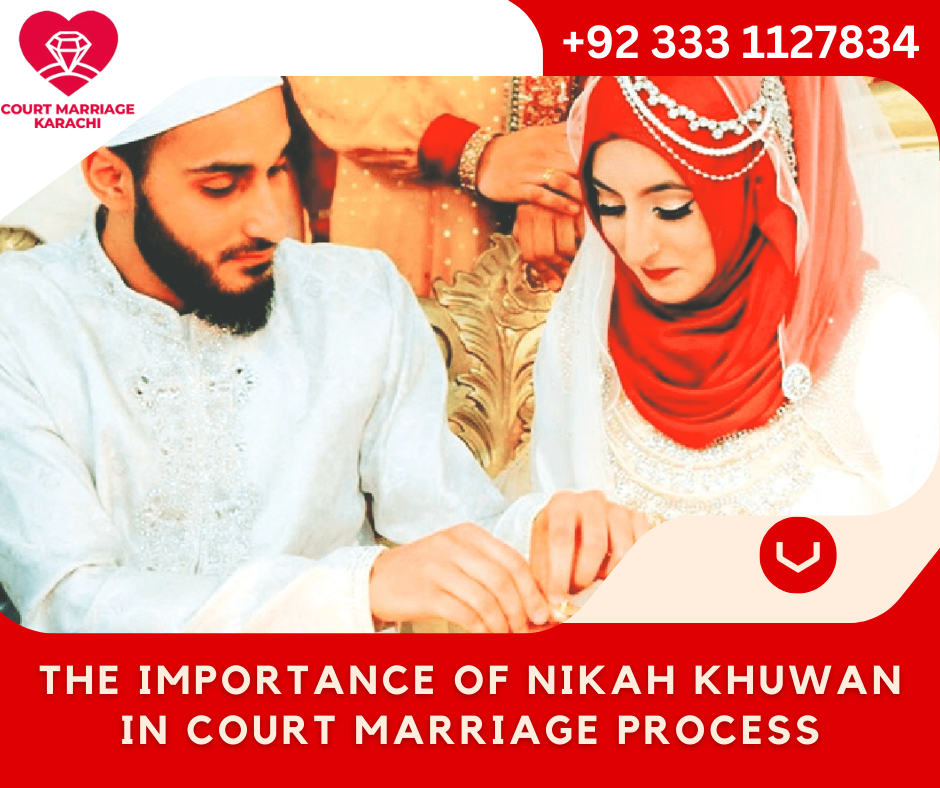
Nikah Khuwan and Court Marriage
Court marriage, also known as civil marriage or a court wedding, is a legal union between two individuals in a government-approved setting, typically a courthouse or a similar government office. It is a secular and legally recognized form of marriage that does not involve religious ceremonies or rituals. Couples often choose court marriages for various reasons, including simplicity, legal formalities, or interfaith unions.
Process
Here’s a general overview of the court marriage process:
- Eligibility: To proceed with a court marriage, both individuals must meet certain eligibility criteria, such as being of legal marriageable age (which varies by country or region), being mentally sound, and not being closely related by blood.
- Notice of Intention: In many jurisdictions, couples need to give notice of their intention to marry at the local government office or courthouse. This notice period may vary from place to place.
- Documentation: Both individuals must submit certain documents, including birth certificates, proof of residence, and photo identification. They may also need to provide details about their marital status, such as proof of divorce or the death of a previous spouse, if applicable.
- Affidavits: Some regions may require the couple to sign affidavits declaring their intention to marry and confirming their eligibility.
- Marriage License: The government office issues a marriage license after the notice period and document verification. This license typically has a waiting period before the actual marriage ceremony can take place.
- Ceremony: The court marriage ceremony is simple and formal. Government-appointed officials often conduct it, such as a magistrate, judge, or marriage registrar. The ceremony usually involves the couple signing the marriage register in the presence of witnesses.
- Witness Requirement: Witnesses must be present during the ceremony, usually two to three individuals who are not closely related to the couple. They sign the marriage register as witnesses to the marriage.
- Marriage Certificate: Following the ceremony’s completion and the marriage register’s signing, the government office issues a marriage certificate. This certificate serves as legal proof of the marriage.
- Registration: In some regions, couples may need to register their marriage with the appropriate government authority. This step ensures that the marriage is legally recognized and recorded.
It’s important to note that the specific requirements and procedures for court marriages can vary by jurisdiction, so it’s essential to check with the local government office or courthouse in your area for the precise process and documentation needed.
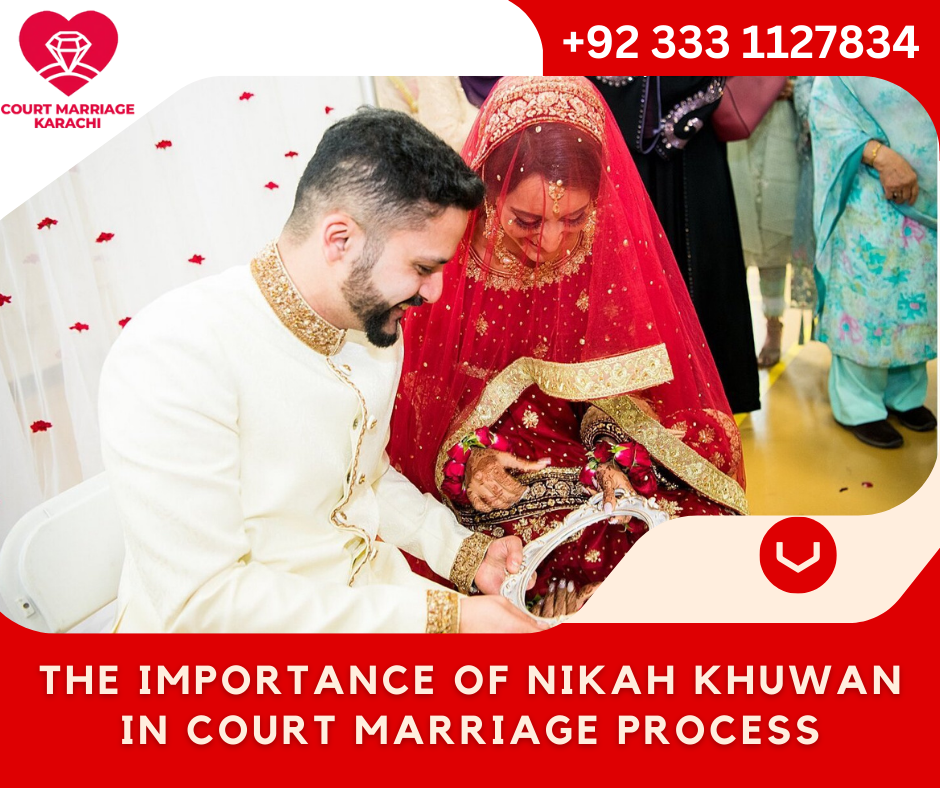
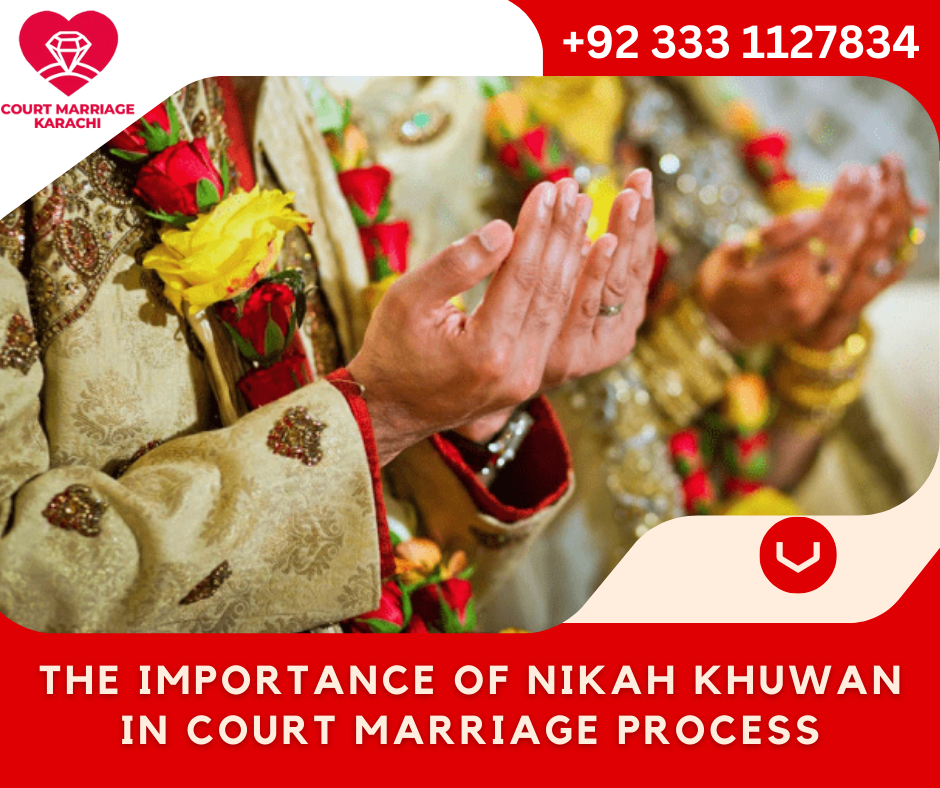
The Vital Role of a Nikah Khuwan in Court Marriage
A Nikah Khuwan, often called a Nikah officiant, holds a significant role in solemnizing a Nikah, a sacred Islamic marriage ceremony. This individual, typically well-versed in Islamic customs and traditions, is the facilitator and officiant during the ceremony. The importance of a Nikah Khuwan lies in several key aspects:
1. Preserving Tradition:
A Nikah Khuwan ensures that the Nikah ceremony adheres to Islamic customs and principles. They guide the couple through the rituals, recite Quranic verses, and offer supplications, preserving the rich traditions associated with Nikah.
2. Ensuring Validity:
In Islamic tradition, consent from the bride and groom is vital for a Nikah’s validity. The Nikah Khuwan plays a pivotal role in obtaining this consent and ensuring that the marriage is conducted in accordance with Islamic law.
3. Legal Recognition:
Even in a court marriage or civil marriage, the presence of a Nikah Khuwan adds a layer of cultural and spiritual significance to the union. They bridge the gap between legal formalities and the religious essence of marriage.
4. Providing Guidance:
A Nikah Khuwan often guides the couple, emphasizing the importance of love, respect, and understanding in their marital journey. They may also offer advice on religious matters and matrimonial responsibilities.
5. Blessing the Union:
The Nikah Khuwan concludes the ceremony with prayers and blessings for the couple’s happiness, unity, and prosperity. These prayers seek divine guidance and signify the spiritual dimension of the marriage.
In the modern era, where online Nikah services and court marriages are increasingly common, Nikah Khuwan’s role remains essential. Their presence ensures that the union is not just a legal contract but a culturally and spiritually significant event that respects Islamic traditions. Whether it’s a traditional Nikah, an online Nikah, or a court marriage, the Nikah Khuwan’s significance lies in its ability to unite two individuals in a legally recognized and spiritually enriched marriage.
The Vital Role of a Nikah Khuwan in Court Marriage/Online Marriage
In the realm of court marriages in Pakistan and online marriages, Nikah Khuwan’s role remains indispensable. While these types of marriages primarily focus on the legal aspects, the presence of a Nikah Khuwan adds depth and cultural significance to the union. Here’s a closer look at the vital role they play:
1. Ensuring Islamic Customs:
A court or online marriage may seem straightforward from a legal perspective, but for many couples, the Islamic traditions associated with a Nikah hold profound importance. A Nikah Khuwan ensures that these customs, such as reciting Quranic verses and seeking blessings, are observed without a traditional ceremony.
2. Validating Consent:
Regardless of the marriage type, consent is paramount in Islam. A Nikah Khuwan is crucial in obtaining the bride and groom’s free and willing consent, ensuring the marriage adheres to Islamic principles.
3. Legal Recognition:
Court and online marriages are legally valid but may need more cultural and spiritual depth than traditional weddings. The presence of a Nikah Khuwan bridges this gap by infusing the union with religious significance, making it more meaningful for the couple and their families.
4. Guiding the Couple:
A Nikah Khuwan often provides guidance and advice to the couple, emphasizing the importance of love, respect, and understanding in their marital journey. They may also discuss religious responsibilities and the significance of a committed partnership.
5. Blessing the Marriage:
The Nikah Khuwan concludes the ceremony with prayers and blessings, seeking divine guidance for the couple’s happiness and prosperity. These blessings add a spiritual dimension to the marriage, regardless of whether it is a court marriage or an online marriage.
Whether court or online marriages, Nikah Khuwan’s presence elevates the union from a mere legal contract to a culturally enriched and spiritually meaningful event. Their vital role ensures that the marriage aligns with Islamic customs and principles, providing couples with a sense of tradition and unity in their journey together. Whether a court marriage is conducted in a government office or an online marriage facilitated through virtual platforms, Nikah Khuwan’s role remains central in creating a harmonious blend of legality and spirituality.
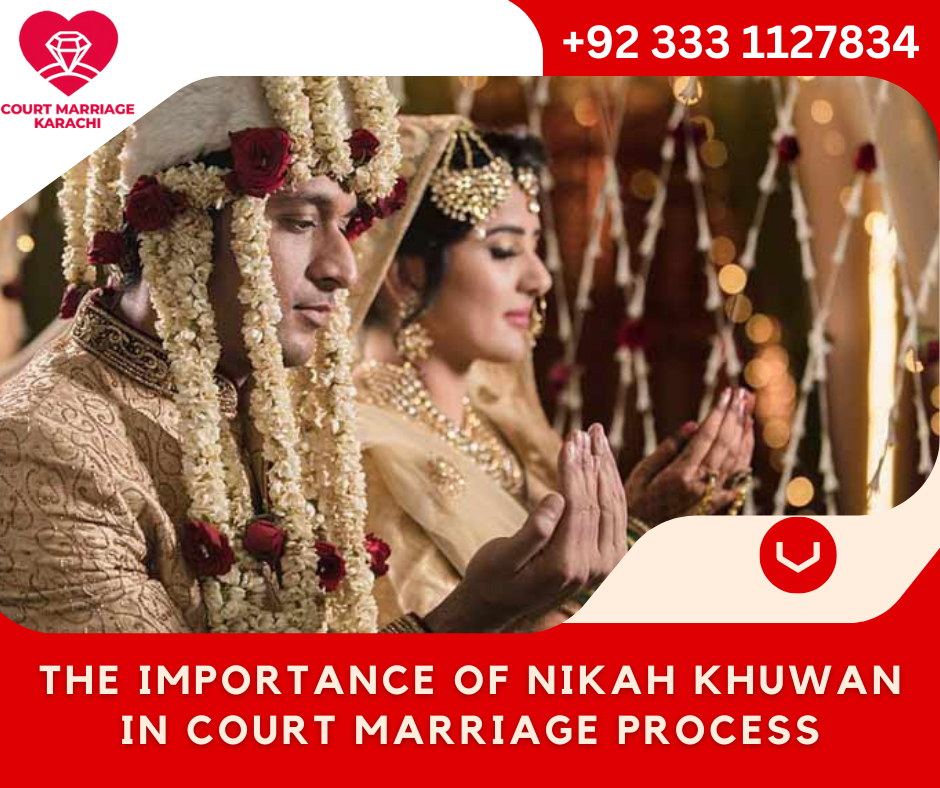
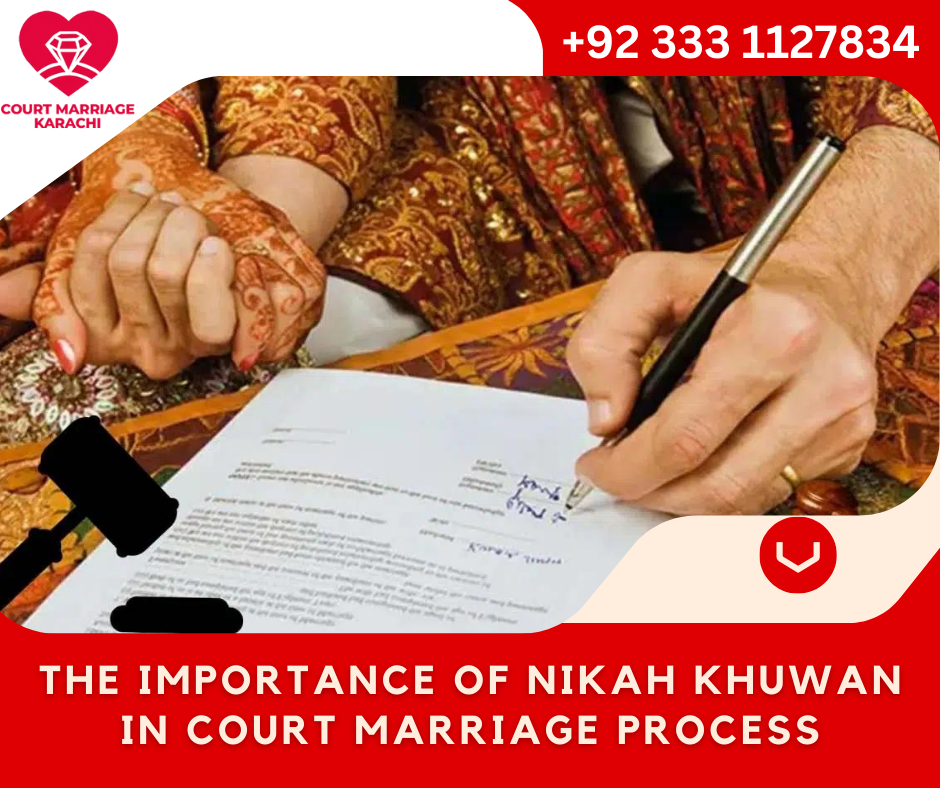
How to Find an Experienced Nikah Khuwan Online
In today’s digital age, finding an experienced Nikah Khuwan online has become more accessible and convenient. Here are some steps to help you locate a reliable Nikah Khuwan for your court marriage or online Nikah:
Research Online Platforms:
Start by searching for reputable online platforms that specialize in connecting couples with Nikah Khuwans. These platforms often provide profiles of experienced officiants, reviews, and ratings from previous couples.
Read Reviews and Recommendations:
Reading reviews and recommendations from couples who have previously used the services of a Nikah Khuwan can provide valuable insights into their expertise and professionalism.
Check Qualifications:
Ensure that the Nikah Khuwan you consider has the qualifications and experience to conduct Nikah ceremonies. They should have a strong understanding of Islamic marriage laws and customs.
Interview the Nikah Khuwan:
Before finalizing your choice, arrange an interview or consultation with the Nikah Khuwan to discuss your expectations any specific rituals or traditions you wish to include, and to gauge their compatibility with your vision for the ceremony.
Verify Availability:
Confirm Nikah Khuwan’s availability on your preferred wedding date. Ensure they are willing to travel to your chosen location, whether it’s a courthouse or an online platform for a virtual Nikah.
Review Fees and Services:
Discuss the fees and services provided by the Nikah Khuwan. Ensure there are no hidden costs and the services are aligned with your requirements.
References and Referrals:
Feel free to ask for references from Nikah Khuwan. Contacting their previous clients can provide further assurance of their reliability and professionalism.
Legal Documentation:
Ensure that the Nikah Khuwan is well-versed in the legal documentation required for a court marriage. They should guide you through the process and assist in completing the necessary paperwork.
By following these steps, you can find an experienced Nikah Khuwan who ensures the legality of your court marriage and adds cultural and spiritual significance to the ceremony. A Nikah Khuwan’s role goes beyond officiating; it symbolizes tradition and spirituality, making your union a meaningful and cherished moment.
Customs and Traditions in Nikah Ceremonies Conducted by a Nikah Khuwan
The Nikah ceremony, conducted by a Nikah Khuwan, is a momentous occasion in Islamic culture, rich in customs and traditions that celebrate the union of two individuals in marriage. These customs and traditions add cultural and spiritual depth to the Nikah ceremony, making it a memorable and cherished event. Let’s delve into some of the customs and traditions often observed in Nikah ceremonies:
- Mehr (Dower): One of the central customs in a Nikah ceremony is the establishment of the Mehr, which is a gift or dowry from the groom to the bride. The amount is specified and agreed upon in the Nikahnama (marriage contract). This custom symbolizes the groom’s financial commitment to the bride’s well-being and security.
- Consent of the Bride: The Nikah ceremony emphasizes the importance of the bride’s consent. The Nikah Khuwan ensures that the bride willingly accepts the groom as her husband. Her consent is a fundamental requirement in Islamic marriages.
- Presence of Witnesses: The Nikah ceremony requires the presence of two adult Muslim witnesses who are not blood relatives of the couple. These witnesses affirm the legality and authenticity of the marriage contract by signing the Nikahnama.
- Recitation of Quranic Verses: The Nikah Khuwan often recites relevant Quranic verses and supplications, seeking blessings and guidance from Allah for the couple’s union. These verses emphasize the sanctity and significance of marriage in Islam.
- Sermon (Khutbah): In some Nikah ceremonies, the Nikah Khuwan may deliver a brief sermon or Khutbah that addresses the couple and the gathering, offering words of advice, encouragement, and religious wisdom.
- Exchange of Rings or Gifts: While not a mandatory custom, some couples exchange rings or gifts during the Nikah ceremony to symbolize their commitment and love for each other.
- Prayers for the Couple: The Nikah Khuwan concludes the ceremony with prayers for the couple’s happiness, unity, and prosperity. These prayers are a heartfelt wish for the couple’s successful journey together.
Legal Aspects of Nikah: What a Nikah Khuwan Guides You Through
In addition to the customs and traditions, a Nikah ceremony has legal aspects vital to ensuring a valid and recognized marriage. A Nikah Khuwan plays a critical role in guiding the couple through these legal aspects:
- Completing the Nikahnama: The Nikahnama, or marriage contract, is a legally binding document that outlines the terms and conditions of the marriage. The Nikah Khuwan assists the couple in completing this document, ensuring that all necessary details, including the Mehr amount, are accurately recorded.
- Consent and Witnessing: The Nikah Khuwan ensures that both the bride and groom provide their free and willing consent to the marriage. Witnesses are present to attest to this consent, making the marriage legally valid.
- Registration: Depending on local laws and customs, the Nikah Khuwan may guide the couple through registering their marriage with the relevant authorities. Registration is essential for legal recognition and rights as a married couple.
- Legal Documentation: The Nikah Khuwan ensures that all legal requirements are met and the marriage adheres to Islamic and local laws. They may also guide on obtaining marriage certificates and licenses as required by the jurisdiction.
- Compliance with Local Laws: In some cases, a Nikah Khuwan may need to ensure that the Nikah ceremony complies with local civil laws, especially in the context of a court marriage. This includes adhering to any additional legal formalities beyond Islamic customs.
